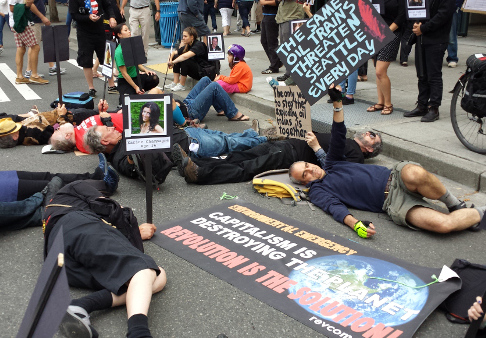Two Years After Oil Train Wreck Kills 47 and Leaves Downtown Toxic:
Protest Lac-Mégantic Oil Train Explosion
July 13, 2015 | Revolution Newspaper | revcom.us
On July 6, 2013, a train carrying oil from the Bakken oil fields in North Dakota derailed and exploded in the small town of Lac-Mégantic in Quebec, Canada. The highly explosive shale oil caused a firestorm in the center of the town that killed 47 people and incinerated 30 buildings. Two years later, the downtown area remains toxic. Reportedly all but three of the remaining downtown buildings will have to be torn down because of contamination.
The substance being carried on the train cars that exploded in Lac-Mégantic was a special type of crude oil, called “Bakken,” after the shale deposit where it is extracted by the process called “fracking.”1 Bakken oil is much more volatile than regular crude oil, and once ignited it also burns hotter than regular crude oil because it is loaded with highly flammable hydrogen sulfide and other chemicals used in fracking.
 Seattle, July 11--Protest on the second anniversary of the Lac-Mégantic oil train explosion. Photos: Special to revcom.us
Seattle, July 11--Protest on the second anniversary of the Lac-Mégantic oil train explosion. Photos: Special to revcom.us

On the second anniversary of the Lac-Mégantic disaster, various environmental groups jointly called a Stop the Oil Trains Week of Action for July 6-12, including protests in 75 locations across Canada and the U.S.
In Portland, Oregon, people blocked the tracks of an oil transfer and storage facility, holding signs with the names and ages of the people killed in Lac-Mégantic.
Various other actions took place in California, the Northwest, and throughout the Northeast. A July 7 press release from Vermont Rising Tide said, “In Addison County, Vermont, over forty organizers with TWAC (Trans and/or Women’s Action Camp) blocked trucks carrying fracked gas from making deliveries at the International Paper mill, resulting in five arrests. In Ticonderoga, New York, over 150 people participated in a symbolic oil train blockade and flotilla highlighting threats to the lake [Lake Champlain] posed by the trains. In Williston, Vermont, 30 people stopped construction on the Vermont fracked gas pipeline—which is on life-support in the face of public opposition and regulatory uncertainty—with four people arrested.”
An organizer said, “We’re saying no to using the Champlain Valley [in Vermont/New York] as an energy corridor. The transportation of fossil fuels is volatile and dangerous whether it’s by pipeline, train, or truck. Extreme energy extraction is destructive in all stages, and we are taking action to denounce the ongoing colonization of First Nations territory in so-called Alberta, and the continued and ever-expanding reliance on fossil fuels.”
In Lac-Mégantic itself, 150 people dressed in white marched on July 6 and went onto the train tracks. A key point of the actions here was to protest attempts by Canadian officials who outrageously are trying to re-start oil train shipments through the town. Despite the horror of the 2013 disaster and how it ripped apart the lives of many people in Lac-Mégantic, the response of authorities has been to increase rail traffic across Canada by three times since the explosion, while putting in place new “regulations” that have done little or nothing to deal with the real danger.
Oil train derailments and explosions have increased dramatically with the huge expansion of fracking for oil in the Bakken shale, which is a key part of the “fracking boom” that has led to the U.S. now leading the world in oil production. These new oil reserves and fracking technology is a boon to U.S. imperialism, which is using the expansion of oil production as an important weapon in the fight with other big powers for economic and strategic domination. (See the revcom.us article “Fracking: An Environmental Nightmare.”) The amount of oil shipped by rail in the U.S. increased 40-fold from 2008 to 2015, and these trains are also crisscrossing Canada. The number of U.S. states where there have been oil train accidents increased from eight in 2010 to 21 in 2014. In 2015, there have already been four high-profile oil train derailments, including one in West Virginia that resulted in an explosion that sent oil and burning oil cars into the Kanawha River.
These derailments and explosions have become so common that activists call trains carrying Bakken crude “bomb trains.” Environmentalists have pointed out that at least 25 million people live in the “blast zones” near tracks where oil trains travel in North America. In addition to the threat of catastrophic explosions of rail cars, the huge expansion in exploitation and burning of Bakken shale oil is further contributing to a global climate change crisis that threatens to spin out of control. Fracking for Bakken oil—as well as the continued hunt for new fossil fuel sources in the Arctic and all the other means the capitalist powers and companies are using to continue to exploit, transport, and burn fossil fuels—must be opposed, and the struggle spread to involve millions.
1. In fracking, wells are drilled vertically down to layers of shale, then horizontally into the layer. Millions of gallons of water, sand, and chemicals are pumped through the well into the rock layer at high pressure to crack apart the layers of shale rock. Aided by the chemicals in the fracking solution, gas and oil flow up the well through these fissures in the rock to be collected. The well bores are cased with cement but they have been shown to fail, leading to methane poisoning of water systems all over the U.S. Many fracking wells have been drilled in areas where people live, even near schoolyards and in people’s backyards and farms. [back]
Volunteers Needed... for revcom.us and Revolution
If you like this article, subscribe, donate to and sustain Revolution newspaper.






